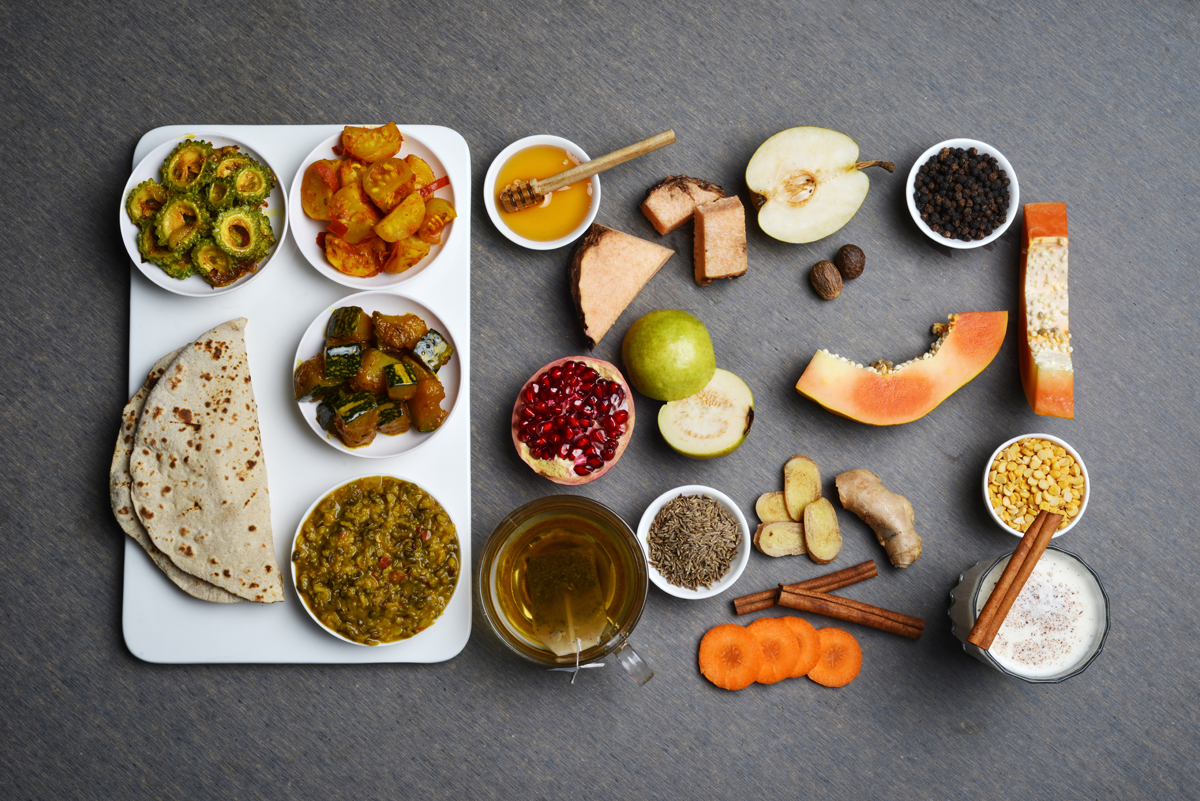
Q1. How can you detox after Holi binging?
According to the divisions of seasons as per Ayurveda, Holi falls in the Ritu-sandhi period, meaning the period between the end of winters and the beginning of spring. During this period, the accumulation of Kapha Dosha takes place inside the body.
Holi celebrations are all about indulging in yummy gujiyas, chaat, samosas, pakoras, etc. This leads to an aggravation of Kapha dosha and hence an increase in Kapha disorders such as weight gain, bloating, and indigestion. To avoid such consequences, it's best to follow some post-Holi detoxification. Following are some ways in which one can detox post-Holi
- Fasting helps detox the body and rids of all the toxins
- Drink lemon juice water twice a day.
- You can also have warm water with half a teaspoon of honey and a pinch of black pepper.
- Have herbal infusions such as rose, lemongrass, moringa, etc. to keep yourself hydrated
- Having 'Sonth' also known as dried Ginger powder with water stimulates digestion and helps eliminate undigested food.
- Consume food which are 'tikshna' (sharp), 'ruksha' (dry), and 'laghu' (light) in nature.
- Indulge in physical activities such as regular exercising, yoga.
Q2. What are some of the best foods to eat during the Holi Detox and how do they help?
One should consume a light, digestion-stimulating diet during detox. The diet should include cereals like Barley, Ragi, and Oats along with the digestive, Kapha balancing spices like Coriander, Cumin, Turmeric, Ginger powder, etc. Vegetables such as Spinach, Karela, Methi, Garlic, Parwal, Ghiya (Lauki), etc., and lentils such as Moong dal should be included in the diet.
Buttermilk with Black pepper, salt, and cumin powder is extremely beneficial for digestion. While observing a fast, fresh fruit juice, vegetable juices, and mono-diets are recommended.
Q3. How can one cure a hangover post-Holi?
Staying hydrated is the key to avoiding hangovers. Drink lots of water to flush the toxins out. One can also have buttermilk with a pinch of salt and black pepper powder to help get rid of nausea and bloating. In cases of constipation, one can also take mild laxatives such as Triphala powder before sleeping.
Q4. What are do’s and don'ts for post-Holi detox?
Do’s
- Keep yourself hydrated. Some options are lemon water with salt, coconut water, digestive soups, kanji, etc.
- Eat light and easy-to-digest meals consisting of fresh, seasonal vegetables, dals & rice, khichri, daliya spiced up with cumin, etc.
- Include spices like saunth, black pepper, fenugreek, and ajwain in your cooking.
- Exercise regularly. Brisk walking, breathing exercises, warm-ups, stretching, yoga, etc. can do wonders to balance Kapha
- Practice Abhyanga or self-massage with medicated oils and powders to flush the toxins.
- Practice oil pulling by swirling oil in your mouth and spitting it out. It helps pull all the toxins out
Don’t’s
- Avoid foods that are difficult to digest.
- Avoid foods that are excess sweet, sour, cold, oily, deep-fried, and heavy.
- Avoid cold drinks including fizzy drinks, cold water, iced teas, etc.
- Avoid milk products.
- Avoid heavy lentils and vegetables such as Black lentils, Chickpeas, Eggplant, and Sweet potatoes.
- Avoid a sedentary lifestyle which includes excessive sleep, reversed sleep cycle, and overeating.
Q5. What else can we do?
Ayurveda advocates “Lokah Purusha Samyama” which translates to ‘Human Being Is A Replica of The Universe'. The quote signifies that an individual is a reflection of their environment. So, if there is any change in the environment, then it will certainly reflect or disharmonize the individual. Therefore, it is best to practice prevention during the seasonal changes as this is the time when unhealthy eating habits can lead to various disorders in the body. To avoid this, one should adopt the seasonal regimen (Ritucharya) as mentioned in Ayurvedic sacred texts.
We encourage you to seek Ayurvedic consultation for your health problems and adapt Ayurvedic principles in your daily life to improve the quality of your life.

Comments (0)
Back to News